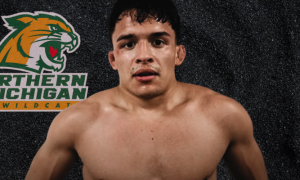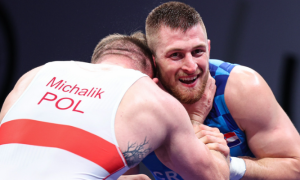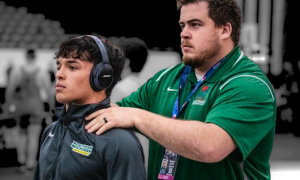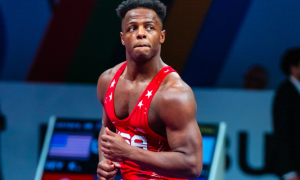The deepest weight at the 2016 Rio Olympics is 75 kg. That’s all you really need to know. World and Olympic medalists highlight this field, including a whole bunch of golds. It’s madness. Plus, unlike 66 kg, which is stacked but has a few old-timers mixed in, most of the top competitors at 75 are either entering or are still in the primes of their careers. There’s no escape. Not that you’d expect any gimmes at an Olympic or World event, but each bout in each round is going to feature at least one wrestler who is absolutely capable of standing atop the podium. This is how it should be. They’ll shove their chips into the middle of the table and figure it all out on Sunday.
Let’s just get Roman Vlasov (RUS, world no. 1) out of the way. The 2012 Olympic gold medalist and two-time World champ fits in here as the standard-bearer. Vlasov is a confident charger who is usually looking to assert control in the ties early. He does this for two reasons. One, so he can set the tone and give the optic he’s trying to initiate action in case maybe, it pays off with a par terre chance. Two, because he actually will use his feet to work to the side and find angles for bodylocks or arm spins. He wants to control the pace and if he can’t, well, he wants to look like he is for favors down the road.
Par terre is where he does his real bidding. There’s no question about it, Vlasov likes his lifts. He’ll go straight or to the side, depending on the length of his opponent and in-match circumstances. It’s an elegant straight lift, Vlasov controls his hip motion and swims underneath his opponents’ waists seamlessly. But you can bottom out, specifically if you’re willing to grit your teeth and jam his lock with your sternum. From PT defense, he is susceptible to being turned twice if he can be turned once. But he doesn’t slip on that banana peel too often.
Kim Heyon-woo (KOR, world no. 4) is another World and Olympic champ and has success against most others in this bracket. Kim is perhaps best known for his energetic pace. The feet are constantly moving, the hands are usually fighting, and he doesn’t fade, certainly not very easily. This isn’t the guy opponents think they can drag into deep water to tire him out. Offensively, he’s an arm-spinner, that is definitely his move of choice. And he can find them wherever and whenever a fraction of a limb is within reach. He’ll go body on occasion, but what happens a lot of times is that the pressure he creates up close results in the distance he needs to open up on one his opponent’s arms.
Straight lifts and guts would figure to be his preferred locks when it gets to par terre. But like everyone else, if the action bogs down Kim will keep it on the mat and try to gut, which he can do fairly well because those legs deliver the momentum-changing force he needs to roll. He’s not super-easy to turn defensively, but it can be done. It’s just that he controls the action so often, that most of the time, it’s a chore to even get him knocked for being passive, making opportunities rather rare.
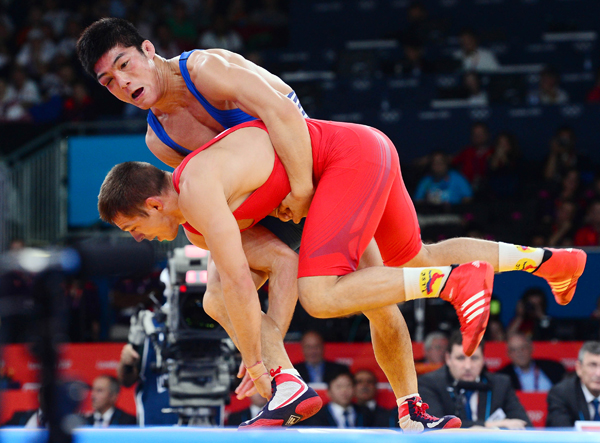
Kim trying to lift Tamas Lorincz (HUN) at the 2012 London Games. (Photo: JPC)
Denmark’s Mark Madsen (world no. 3) is a monster and wrestles like one. The 5’9 brute could reasonably pass for an 85’er, especially lately. He’s also been a bridesmaid of sorts, nailing down silvers at four different World Championships with a bronze mixed in. Vlasov beat him in a tug-of-war final last September in Vegas and shut him out. Madsen rebounded with nice performances at the Golden Grand Prix and the Nordic. For recent context, Kim beat him at the Golden Grand Prix and then Madsen returned the favor in a somewhat eye-opening final in Poland a couple of months ago. The reason it was kind of quizzical is because Madsen out-hustled Kim. He basically bullied him around the mat a bit and won on two step-out points.
Madsen is a stud up-top and boy, if he doesn’t try to employ his considerable strength up close. He’s not the most fluid cat of the litter, he can get a little clunky here and there. But when Madsen is in on something he likes, he appears as confidently artistic as you’d like to see. Those fast-twitch muscle fibers are a sight to behold. PT-wise, he’s a lifter first. That doesn’t mean he won’t go conventional-gut, it’s more like he figures he can get an adequate crunch and plant to load up. Oh, and he can be turned himself. This is Madsen’s second Olympic Games, as he took fifth in 2012.
Yeah, yeah, you have to keep watch on Saeid Abdevali (IRI, world no. 10). The 2011 World Champion is probably itching to get the taste out of his mouth from the 2012 Olympics, where he was upset early on. Abdevali owns a stellar career resume with an Olympic medal standing out as the one thing he’s missing. He is only 26, which is pretty impressive in its own right. Abdevali is an aggressive, capable scorer who hits side lifts that are both flowery and violent. There’s no waiting around, no overdrawn push-pull, halfhearted exchanges. Can he be dissuaded from trying to go big? Yes. Abdevali has some front-running tendencies, too. That doesn’t make him any less of a candidate to medal, however.
25-year old Zurabi Dastunashvili (GEO, world no. 6) is getting closer. Another London holdover, Datunashvili has some impressive tournament wins under his belt, including a Golden Grand Prix title (2014) and a gold from this year’s European Championships. He hasn’t quite broken all the way through just yet, though it seems imminent. Datunashvili is a reminder of why the current rules are so much better. As a big-time thrower, he is constantly searching for transitions that setup angles and opportunities. He’ll lock up high or low, it doesn’t really make too much of a difference to him. Sometimes he can caught in quicksand and though he’s no weak link, there are other competitors at this weight who have higher resistance thresholds.
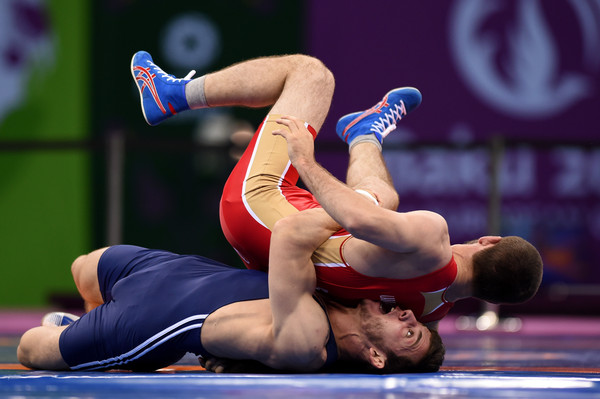
Datunashvili locking for two. (Photo: Matthias Hangst)
It’s probably not a great idea to discount Dozshan Kartikov (KAZ, world no. 2). Like Datunashvili, Kartikov is another athlete on the rise and is certainly a wrestler you shouldn’t be surprised about if he were to advance into the medal rounds. He took a bronze at last year’s Worlds, having earned an impressive win over Kim in the quarters before getting iced by Vlasov. In that tournament, Kartikov was a smooth operator, letting the action come to him in ways he could deal with. It’s how he beat Kim and also, how he slid past Elvin Mursaliyev (AZE, world no. 13) to snag his bronze.
Kartikov isn’t going to pin his ears back and plow forward. He has a slight inclination to get tied up into knots and slowed down, which is okay with him for the sheer fact he’s a par terre guy. He’ll wait for his scoring chances on the mat and if/when they arrive, that’s where he tries to make it count. Kartikov can certainly be scored on when he’s on defense, though to be fair, the dudes who usually score on him score on everybody else, too.
Viktor Nemes (SRB, world no. 7) doesn’t figure to be forgotten about, either. You know Nemes, right? I mean, he’s been around for a while, his career expanding in incremental steps. Nemes started gaining traction as a Junior, even though he never quite won the big one. That’s okay, because the Senior level is where he’s come alive over the past few years. The one thing you have to respect about Nemes is that he’s a worker; nothing was given to him, he progressed at his own rate and look, he’s now one of the most dangerous guys in the toughest weight at the Games. That’s saying something.
Nemes stalks and stalks, shows confidence in the ties, and will back-step on just about anyone. He can be flustered, too, but not in a wave-the-white-flag kind of way. Instead, when Nemes finds himself in an exchange he can’t deal with, it looks more like a frustrated infant trying to break out of a swaddle. From par terre, he’s a gutter, but that isn’t to dismiss his straight-lift, which can be a dynamic move for him.
What Bisek Brings
The unquestioned leader of the US Greco Roman Olympic Team, Andy Bisek (USA, world no. 5) is in the fortunate position of having grown into his status as one of the world’s best. In a way, he’s not all that dissimilar from Nemes in that Bisek has gotten to where he is out of a combination of intense desire and God-given ability that only the strains of elite competition could have ciphened out of him. American Greco fans have witnessed this from the front-row for years, but it’s not a secret anymore. With two-World bronze medals, a couple of Granma Cup wins, and Pan Am golds, everyone at this weight understands what Bisek can do. Just ask Vlasov or Abdevali.
One of Bisek’s biggest strengths is that he refuses to slow down. There’s no off-switch, no lever someone can pull that will all the sudden reduce his speed. The only recourse his opponents can hope for is to tie him up and elbow-check inside, in which case, Bisek will just angle out to find another pocket to exploit. The only (recent) anomaly to this is when Madsen dumped him in Vegas last year. Madsen took an arm and back-rolled as Bisek pressured in. Even at Beat the Streets in May, Kim grabbed an arm-throw, but only received two for the effort. On practically anyone else, that’s a four-pointer. But these aren’t conciliatory examples: If Bisek doesn’t want to be moved, he won’t be. Opponents need him to play forward in order to even have a chance on their feet.
Since Bisek’s style is of the dogfight variety, he has acquired the gas tank necessary to charge ahead. There isn’t a second period drop-off with this guy. If anything, Bisek is stronger in the second frame. He comes forward, knuckles up, and lets his immense leg strength carry the tempo. We always talk about Kim, how Kim is such an energetic dynamo, but Bisek does not take second-fiddle to him when it comes to conditioning. Or anyone else, for that matter.
Of course, Bisek has faced off with just about everyone here and there is no one in this bracket that coming in blind, any reasonable wrestling observer could tab as a legit favorite over him. Now, you could make that argument for most here, given this bracket’s depth. But it would be positively hilarious (and irresponsible) to think that a two-time World bronze medalist who owns victories over some of the weight’s top talent is fighting steeper uphill battle here than the others. Trace Bisek’s career trajectory for a minute. He has chipped and chipped away at the wall. And that thing is ready to come crumbling down in Rio.
Can Bisek Win?
Oh, you better believe it. It’s not because he’s “our guy” or because he deserves it the most. There’s no such thing as “deserve” in the Olympics. The best guys who have the best days are who shine through most often. Without a doubt, the other 75 kg competitors at the 2016 Rio Olympics are just as motivated and hold just as much stock entering Sunday’s tournament. The difference here is that Bisek definitively understands where he needs to go against his potential opponents, and that is to “the dark place.” He does his best work when staring down the barrel of a gun, and there will be plenty of rifles aimed in his direction.
Bisek’s par terre offense is probably, along with his pace, the x-factor here. His gutwrench arsenal and application is nearly legendary, and has been able to turn the beasts of this division in the most clutch moments you could ask for. He’ll go straddle first a lot of the time. He feels out the situation to see if it’s even worth it for him to post up. That isn’t to say he won’t simply plant and load on a whim, but Bisek knows whether or not the weather is correct before he commits precious par terre time to going full straight-lift. So while you can’t say he’s only a gutter, it is definitely the bedrock to his game.
One thing to watch out for in a bracket this stacked is that some of the men mentioned here will be knocked off early. It has to be that way. Not everyone can win. And sure, you want to base your comparisons going by the fact the World gold (Vlasov) and silver (Madsen) will be separated in the bracket. It’ll be interesting to see which bowling pins fall first. Either way, it is probably best to envision Bisek having the toughest road to the medal rounds possible, if only because then you know for sure, without question, everyone will be seeing exactly what he’s made of, which is something awfully special.

Notice: Trying to get property 'term_id' of non-object in /home/fivepointwp/webapps/fivepointwp/wp-content/themes/flex-mag/functions.php on line 999


